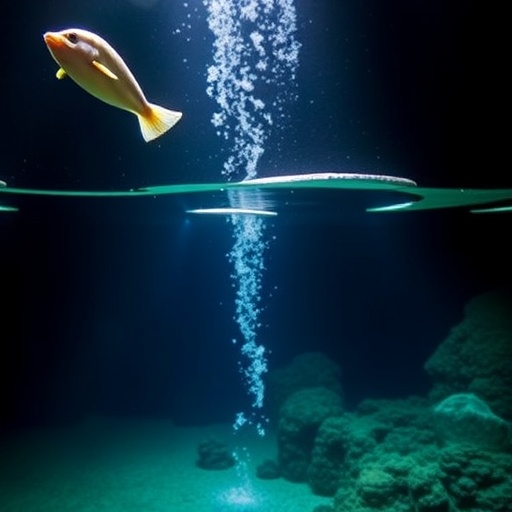Recent findings presented in the journal Commun Earth Environ have unveiled the intricate dynamics of submarine karst springs, pointing to crucial tipping points that affect both flow reversal and saline intrusion phenomena. This research, led by a team including Maréchal, Ladouche, and Lamotte, emphasizes the delicate balance within subterranean water systems and their responses to various external stressors.
Submarine karst springs, often overlooked in the broader context of hydrology, serve as critical indicators of environmental change. These springs originate from the dissolution of soluble rocks, primarily limestone, which creates intricate and interconnected underground water systems. As freshwater sources intermingle with saline water from the sea in these karst environments, the resultant phenomena can directly impact coastal ecosystems and water quality. This latest research explores how these springs can shift between different states of flow, a process termed hysteresis, where the water source does not revert to its original state even after conditions that initiated a change have stabilized.
The researchers employed a combination of field studies and hydrological modeling to assess the behavior of these underwater springs in response to varying climatic and anthropogenic influences. Their findings provide a clear narrative of how hydrogeological systems can exhibit non-linear responses when subjected to stress. Remarkably, the team identified specific thresholds—tipping points—beyond which the system’s behavior dramatically shifts, potentially leading to irreversible ecological consequences.
One of the most compelling aspects of the research is its relevance to ongoing discussions about climate change and its impact on freshwater resources. As global temperatures rise and sea levels fluctuate, understanding the mechanics underlying submarine karst springs becomes increasingly vital. Changes in precipitation patterns, increased evaporation rates, and sea-level rise combine to exert pressure on these delicate systems, forcing them to adapt in sometimes unpredictable ways.
The concept of flow reversal described in the study highlights a critical aspect of these underwater systems. During certain climatic conditions, the natural flow direction of freshwater springs can be reversed, allowing saline water to intrude. This process, if not monitored, can lead to significant degradation of freshwater resources, jeopardizing the health of both local ecosystems and communities that depend on these vital water supplies.
Researchers meticulously tracked the salinity levels over time, revealing distinct patterns associated with various environmental variables. The data showed that increased rainfall could sometimes lead to a higher influx of freshwater, pushing back against saline intrusion. However, there were scenarios in which the intrusion occurred despite ample rainfall, indicating a complex interplay between external conditions and internal system dynamics.
Furthermore, the study brings to light the potential for human activity to exacerbate these issues. Urban development, industrial activities, and increased water extraction have compounded the stress on submarine karst systems. The researchers stress that without proactive management strategies, coastal regions might face severe risks, including loss of biodiversity, increased vulnerability to flooding, and diminished freshwater quality.
The research findings suggest an urgent need for integrated water resource management that prioritizes understanding and protecting these submarine systems. Enhanced monitoring and modeling efforts can yield insights that are vital for local decision-makers as they navigate the complexities of urban planning, environmental protection, and sustainable development in coastal areas.
The implications extend beyond just environmental concerns; the stability provided by these springs can also support tourism and local economies that thrive on natural resources. By spotlighting the role of submarine karst systems in the broader ecological framework, this study advocates for increased public awareness and engagement in conserving these critical freshwater sources.
In addition to immediate environmental implications, the research opens a discourse on the interconnectedness of global water systems. As underscored by climate modeling scenarios, the dynamics observed in submarine karst springs can serve as microcosms for understanding larger hydrological changes across the globe. This broad perspective invites collaboration among scientists, policymakers, and communities in addressing the challenges posed by climate change.
Public interest in water-related issues is growing, making the timing of this research ever more relevant. As communities around the world grapple with water scarcity and declining water quality, findings like these shed light on the importance of strategic action to preserve and protect natural water systems.
This research heralds a call to action, pushing for greater recognition of submarine karst springs in discussions surrounding water resource management and climate adaptation strategies. As the study indicates, the decisions made today will significantly impact the sustainability of these vital systems moving forward, demanding an interdisciplinary approach that bridges scientific understanding with effective policy implementation.
Through rigorous investigation and innovative methodologies, the researchers have laid a foundational understanding of these submarine karst springs and their hysteretic behavior. Their work encourages continued inquiry into the factors that influence these fascinating water systems, as well as advocacy for the critical importance of preserving them for future generations.
In summary, the team’s exploration into the hysteresis of submarine karst springs not only outlines the cascade of environmental changes linked to tipping points but also emphasizes the urgent need for adaptive management strategies as we face the growing impacts of climate change. The interconnected nature of these systems serves as a poignant reminder of our responsibility to safeguard our natural resources in an ever-changing world.
Subject of Research: Submarine Karst Springs
Article Title: Hysteresis of submarine karst springs reveals tipping points in flow reversal and saline intrusion phenomena.
Article References:
Maréchal, JC., Ladouche, B., Lamotte, C. et al. Hysteresis of submarine karst springs reveals tipping points in flow reversal and saline intrusion phenomena. Commun Earth Environ 6, 697 (2025). https://doi.org/10.1038/s43247-025-02522-8
Image Credits: AI Generated
DOI: 10.1038/s43247-025-02522-8
Keywords: submarine karst springs, hysteresis, flow reversal, saline intrusion, water resources, climate change, ecological consequences, tipping points, hydrological modeling.




